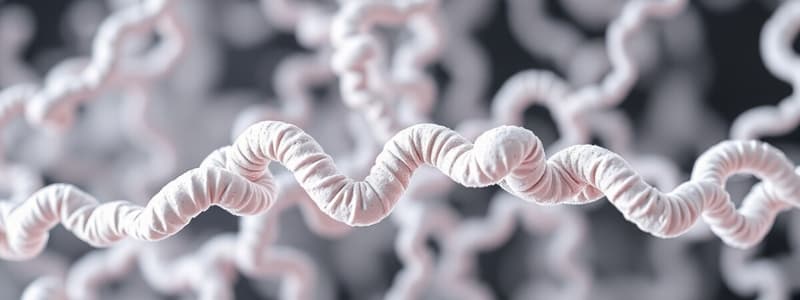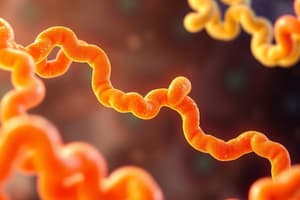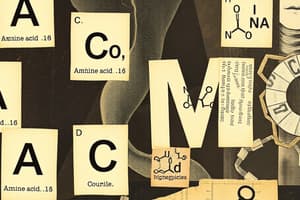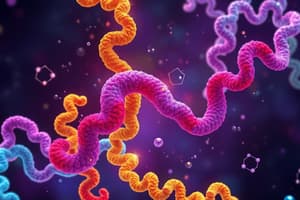Podcast
Questions and Answers
Which of the following amino acids is classified as hydrophobic?
Which of the following amino acids is classified as hydrophobic?
- Isoleucine (correct)
- Tyrosine
- Serine
- Glutamine
All amino acids can gain or lose protons and participate in hydrogen bonds.
All amino acids can gain or lose protons and participate in hydrogen bonds.
False (B)
What are the two categories of amino acids based on their necessity in human diets?
What are the two categories of amino acids based on their necessity in human diets?
Essential and nonessential amino acids
Proline is often referred to as an __________ acid.
Proline is often referred to as an __________ acid.
Match the following amino acids with their classifications:
Match the following amino acids with their classifications:
Which amino acid is known for forming glycoproteins due to its polar nature?
Which amino acid is known for forming glycoproteins due to its polar nature?
Hydrophobic amino acids tend to cluster on the exterior surface of proteins in aqueous environments.
Hydrophobic amino acids tend to cluster on the exterior surface of proteins in aqueous environments.
Name two amino acids that have basic side chains.
Name two amino acids that have basic side chains.
Amino acids with __________ side chains are primarily hydrophilic and can participate in hydrogen bonding.
Amino acids with __________ side chains are primarily hydrophilic and can participate in hydrogen bonding.
Which amino acid is known to often interrupt alpha-helices due to its unique geometry?
Which amino acid is known to often interrupt alpha-helices due to its unique geometry?
Which amino acids are classified as essential or indispensable?
Which amino acids are classified as essential or indispensable?
Lysine and arginine have positively charged side chains at physiological pH.
Lysine and arginine have positively charged side chains at physiological pH.
What amino acid in sickle cell anemia is replaced by valine?
What amino acid in sickle cell anemia is replaced by valine?
Glycine is unique among amino acids because it has a __________ carbon.
Glycine is unique among amino acids because it has a __________ carbon.
Match the following amino acids with their classification:
Match the following amino acids with their classification:
Which of the following amino acids is classified as nonessential or dispensable?
Which of the following amino acids is classified as nonessential or dispensable?
D-amino acids are commonly found in all proteins.
D-amino acids are commonly found in all proteins.
Name the amino acids that are considered partially essential.
Name the amino acids that are considered partially essential.
Basic amino acids accept protons, while acidic amino acids are __________.
Basic amino acids accept protons, while acidic amino acids are __________.
What is the role of buffers in amino acid solutions?
What is the role of buffers in amino acid solutions?
Flashcards are hidden until you start studying
Study Notes
Amino Acid Chemistry
- More than 300 amino acids are found in nature but only 20 are commonly found in mammalian proteins
- Amino acids are building blocks of proteins
- Amino acids are classified based on the properties of their side chains:
- Nonpolar side chains: hydrophobic, lipophilic, do not participate in hydrogen or ionic bonds
- Uncharged polar side chains: hydrophilic, have zero net charge at neutral pH
- Acidic side chains: hydrophilic, proton donors, negatively charged at physiologic pH
- Basic side chains: hydrophilic, proton acceptors, positively charged at physiologic pH
- Nonpolar amino acids tend to cluster in the interior of proteins in aqueous solutions
- Proline is an imino acid and forms the fibrous structure of collagen
- Sickle Cell Anemia is caused by a substitution of valine for glutamic acid in the beta chain of hemoglobin
- Amino acids are also classified by nutritional requirement:
- Essential amino acids: Isoleucine, Leucine, Threonine, Lysine, Methionine, Phenylalanine, Tryptophan, and Valine
- Nonessential amino acids: Aspartic acid, Glutamic acid, Glycine, Alanine, Proline, Serine, Cystein, Tyrosine, Glutamine, and Asparagine
- Partially essential amino acids: Histidine and Arginine
- Amino acids exist in two forms (D and L) due to the asymmetric center at the α-carbon, these are optical isomers
- All amino acids found in proteins are of the L-configuration
- Glycine is the only amino acid that does not have optical activity because it has a symmetric carbon.
- Amino acids can act as buffers because they have weakly acidic α-carboxyl groups and weakly basic α-amino groups
Studying That Suits You
Use AI to generate personalized quizzes and flashcards to suit your learning preferences.




